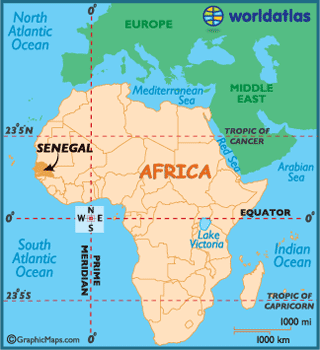On US soil in Africa
- Vickie Obenchain

- Apr 19, 2018
- 4 min read
Updated: May 15, 2018
Today we started off going to the US Embassy of Dakar to learn how the Senegalese and American people work together and also how the US is helping with their education/English system. The embassy was oddly but conveniently is across the street from our hotel.
As we approached, a few teachers took out their cameras to take a picture of the Embassy and so they could post to their blogs that we had been there. As they did so, I considered this, but then noticed three armed guards approaching my camera holding colleagues. Apparently you are not allowed to take pictures of government and military facilities, and therefore those who took the photos were detained at one of the security check points, had their pictures deleted and their passports were ran and documented. During this process they were “deported” from American soil, (i.e. asked to stand across the street) until this was all taken care of.
The rest of us, watched as we waited our turn to go into the embassy, not too concerned that they would be in real trouble, but leave it to the American teachers to get in trouble on American soil in Africa.
Once inside we heard from a lot of wonderful Senegalese English educators and Policy Administrators. And we talked to two members of the Foreign Service and learned about the process, pros and cons of the job and why they choose the foreign service.
It was a really interesting morning; needless to say, I do not have many pictures documenting this morning, but heard we may get one that was taken with the acting diplomat. So one may appear later!

_______________________________________________________________________
Senegal, “Land of Teranga” (meaning hospitality)
After lunch we learned a bit about Senegalese culture, which I am still a bit blown away by. We also learned some Wolof, so we could communicate more with the Senegalese people. While I took in a lot, I will throw out some of the more interesting points below:
Greetings are very important to their culture and are not just a “hello”. Hand shakes are essential, you should ask about the person, their family, and the greeting should make them feel as if they are important
You would never ask a question before a proper greeting, or you may be ignored
A younger person will always greet an older person first
Their ideals are based on peace
Their motto is: One people, one goal, one faith
The name Senegal is believed to be a Wolof word, Sunugaal meaning “our boat”
The believe it is better to lie for peace than to tell the truth and bring fighting
Flag Symbolism:

Green represents the Muslim Religion
Yellow represents prosperity
Red represents their past fight against colonization, or the blood shed by their ancestors
And the 5 pointed star represents their openness to working with/trading with the 5 other continents (Antarctica is not considered in this).
Family is of great importance
When a man wishes to marry a woman, he pays money in the form of a dowry to the woman’s family
The woman takes care of her husband, kids and her husband’s family. She makes the food, cleans the house, laundry, etc. as well as having a job outside the home. The man is to be taken care of by his wife. When asked if the women minded, they said no, it is what they do.
When the woman has a baby, the woman’s family gathers gifts and gives the husband’s mother (the baby’s grandmother) the gifts as a sign of respect and generosity which she will disperse to her own family members.
Money which is earned by all members of a family, is given to the family (typically to be decided how it will be spent by the grandparents) to use for the family. One may not have their own money if the money is needed by the family.
_______________________________________________________________________
After this we gathered by our hotel pool and discussed the rest of the week and prepared to go teach at our selected schools. Afterwards a few of us walked along the beach. It is incredibly beautiful here, and yet I was incredibly saddened by the amount of plastic trash on the beach. Even some fish, I believe they were puffer fish, had been washed ashore in old discarded fishing nets. As this is a topic I am pretty passionate about, I talked with one of our host teachers about this and they said that trash is a real problem in Senegal. Due to strikes and their national landfill being full, trash is a challenge. Volunteer groups work to remove plastics along beaches. Some schools are now starting environmental clubs to help educate others, as this is a real issue for them.
________________________________________________________________________
I ended the day walking down the street to the American Food Store, to see what exactly that was. And surprisingly, it was exactly what it said. It sold tons of American junk food, soups, crackers, etc. Since the embassy and resorts are near by it caters to that clientele. I figured my middle schoolers would have loved it!






















Comments